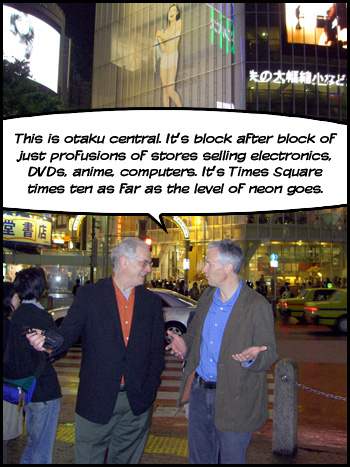
Japanese stuff in Japan
"Manga is sold everywhere, basically," says Ignacio Adriasola, our interpreter. "Every single bookstore you go to, every single kiosk is bound to have at least some. Any convenience store you walk into has manga. So it's ubiquitous."
Ignacio is a young Chilean. He lived in Japan for six years, got his university degree there. And he's now a grad student in the U.S. Talk about globalization!
Ignacio took us around the Akihabara. This is a place that is either very hip or very nerdy, depending on your point of view.
"Basically, it's really famous because of the otaku, the people that are very, very interested in these games and comic books," says Ignacio.
"Otaku" is a Japanese word that is used to refer to young people who spend almost all their time playing video games, reading manga and watching anime. People used to really look down on the otaku. They were nerds. Social pariahs. But now, with the popularity of Japanese pop culture, all of a sudden it's kind of cool to be otaku.
There were lots of people standing under awnings in front of store fronts, out of the rain, playing video games. Everywhere you looked there was another monitor showing the latest anime TV show or movie that you could buy on DVD.
What hits you is the sheer volume of the product that's out there. I guess you shouldn't be too surprised about it. Half of all movies and TV shows made in Japan are animated. And one-third of all books sold in Japan are comic books.
"I say it's like air in Japan. I mean it's just something that people grow up with," says Susan Napier, a Japan scholar at Tufts University in Boston. "So they wouldn't really think of it as, 'Is it popular?' It would be like saying, 'Is Hollywood cinema popular in America?'"
Napier wrote a book on anime a few years ago. Now she was spending a year in Japan writing two more books on Japanese youth culture and Japan's place in the Western imagination.

Susan Napier, Japan scholar at Tufts University.
She makes the point that Japan has had an impact on Western culture that dates back to when Japan opened up to the West in the 1850s.
"I don't think we would have modern art now if it hadn't been for the discovery of Japan," she says. "That the influence on the Impressionists, first, was so huge, and then you just have a roster: Van Gogh, Gauguin, Klimt."
And writers too, Napier says. She talks about how Japanese literature inspired poets like Yeats and Ezra Pound.
"And then in the 1950s," she says, "sort of zooming ahead here, you have the dharma bums - Kerouac, Ginsberg, Gary Snyder - very much influenced by Zen."
But Impressionists, Van Gogh, beat poets, that was really the avant-garde. It was cutting edge. It was unusual. Today, Japanese pop culture, we're talking pop culture, is almost mainstream in many parts of the world.
"Anime is huge in South Africa, Mexico, China-it's really a major global product as well," says Napier.
Japanese pop culture is especially hot in France, itself no slouch when it comes to culture.
And did you know that in Europe, 80 percent of animated television shows are made in Japan? So there's no question that Japan's pop culture is having a major impact. And Napier thinks it's at least partly a sign of the times. There's the Internet, we have this information technology, so ideas and products can just zip around this global economy with unprecedented speed.
And young people love to use the Web to share the stuff they're reading and seeing and listening to. Like music files or the latest TV show from Tokyo.
"You can now download the latest anime that's big in Japan this week," says Napier, "and then of course you have the magic of dubbing and subtitling and things like that."
So you take a rich and very urban society, and one with a very old culture, but also a very modern sensibility. And we've been talking about the Japanese knack for stories with sudden transformations, or characters that jump back and forth between reality and virtual reality. And then on the receiving end, you have a young generation that lives in a world that feels like that. There's a world of rapid change and all these virtual experiences.
Which brings us back to the otaku. The otaku are the biggest fans of anime, manga, video games. And Susan Napier thinks there's a little bit of otaku in all of us.
"We're all becoming increasingly wired," she says. "We're all increasingly getting into the boundaries, we're crossing over the boundaries between virtual reality and reality every day, more and more, without really knowing it. So I'm [looking at] the otaku now, not just as a Japanese phenomenon, but as ultimately saying something about modern civilization, if you can call it civilization."
![]()

